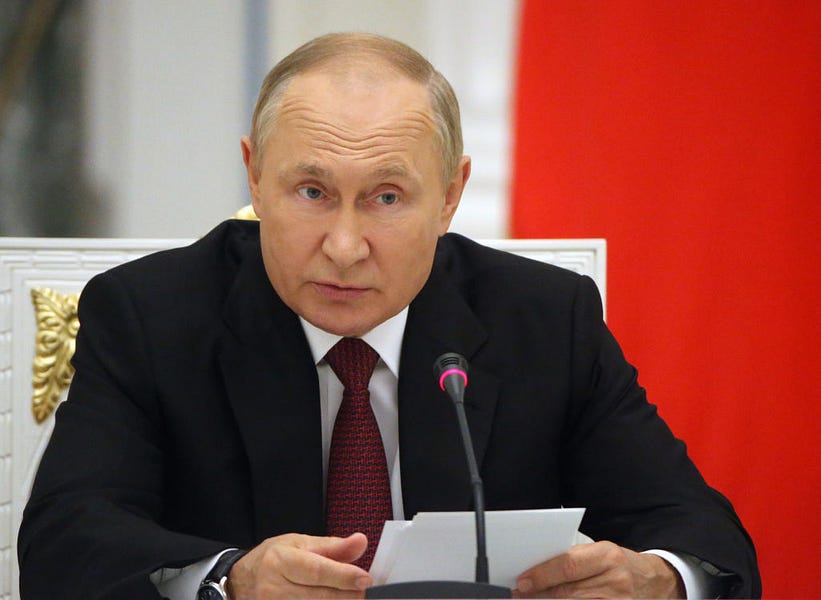My favorite quote about the war in Ukraine comes not from Volodomyr Zelensky—though the Ukrainian president had some bangers—but from a local official in the country’s south. “We are fighting against f—ing idiots. It’s good for us,” he told the Guardian last month before the Ukrainian army’s lightning advance in the northeast. “But they have nuclear weapons. Russia is like a monkey with a hand grenade. It’s a problem for the whole world.”
That metaphor resonates, and not just because its evocative absurdity appeals to a writer’s sensibility. It’s because a monkey with a hand grenade is as likely to destroy itself as it is anyone else.
I write with humility about war, having never served and lacking any qualification resembling expertise on military matters. But a remarkable thing about Russia’s folly in Ukraine was how quickly it revealed itself as folly even to rank amateurs like me.
There are receipts. On day three of the war I wrote that it seemed already to have the makings of a strategic debacle, with Putin having gambled his prestige on two dubious propositions. First, that Ukrainian civil society would disintegrate upon contact with Russian military might. Zelensky would flee, bureaucrats would switch sides, and the army would offer token resistance before capitulating. Second, that the Ukrainian people would welcome their captors as liberators, to borrow a phrase. Experts judged at the time that the Russian force of 200,000 men was grossly insufficient to pacify a hostile population of 44 million. But if the population turned out not to be hostile, if it too capitulated out of fear or residual Russian patriotism from its days as a Soviet state, the force was more than adequate. Two hundred thousand men to quell a rebellion is plenty if the rebellion never begins.
In gambling terms, Russia was betting on an exacta. It needed both prongs to come through to collect its winnings by absorbing Ukraine. If Zelensky rallied the people, if the Ukrainian army was game for a fight, the Anschluss Moscow expected would dissolve into war or insurrection or both. And while experts knew Russia was unprepared to manage an insurrection, even they were surprised by how underprepared it seemed for war. The Kremlin sent into battle an army it believed had been “modernized” only to find it hamstrung by poor logistics, substandard equipment, and an archaic command structure. Where the money appropriated for modernization went is anyone’s guess; presumably it’s living its second life as downpayments for dachas and living expenses for mistresses of apparatchiks inside the Russian government. Whatever its fate, it may be that no Western observer was as shocked to see how little Russia’s defense spending had purchased by way of battlefield effectiveness as Putin himself.
Russia lost both prongs of its bet. Even so, it might have subdued Ukraine—temporarily—through brute force if not for a third miscalculation, that the West would shrink from confrontation with Russia if Ukrainians had the temerity to resist. The prospect of the war spiraling into a regional, or world, or nuclear conflict would keep the U.S. and NATO sidelined just as it did in Syria, Moscow believed. Some nominal sanctions would be ordered and a few weapons shipped to Kyiv to signal halfhearted solidarity, but Russia’s lopsided advantage in firepower would endure and finally grind Ukraine down.
The sanctions ordered turned out not to be nominal. The weapons and logistical support Ukraine received from its Western patrons, particularly in the form of intelligence, were not halfhearted. As of three weeks ago, following tens of thousands of Russian casualties and the skillful deployment of U.S. HIMARS systems by Ukrainian troops, the Pentagon whispered to reporters that the two sides were approaching parity on the battlefield. Abrams tanks might be on their way into Ukraine sooner rather than later.
Americans have grown accustomed to foreign-policy disasters derived from underestimating the difficulties of war but I doubt we’ve ever experienced one this disastrous. Russia misjudged the enemy’s will, its ability, and the extent of its international support by degrees so catastrophic that there’s now a risk that the bulk of its army will break on the fields of Ukraine. If you believe Ukrainian estimates, nearly as many Russian soldiers have died in seven months of combat as American soldiers in 12 years in Vietnam.
Extricating oneself safely from a situation as precarious as that requires sound judgment and a sober reckoning with one’s failures. Instead the world is confronted by a monkey with a hand grenade, one whose pride is wounded.
Which brings us to Russia’s new mobilization.
It’s a testament to how diminished the country’s reputation is among military experts that the prospect of 300,000 more men joining the battle—or is it a million?—is viewed widely as a concession of weakness, not a display of strength. Superficially it echoes the Red Army willing itself to victory in World War II through remorseless sacrifice, overwhelming the Germans with unfathomable numbers of men and artillery. But while the sort of lowbrow nationalist who’s impressed by the machismo displayed in Russian military recruiting ads might find the order to mobilize intimidating, most strategists to whom I pay attention see it as an act of desperation that may do Russia more harm than good.
Not all. CNA’s Michael Kofman argued this week that in one respect having more men under arms is an obvious asset. Russia’s best play for a “good” outcome in Ukraine at this point is to hang on until winter, continue to wear down the Ukrainians, and hope that Europe’s hunger for Russian gas eventually erodes its resolve in backing Kyiv. Russia can outlast Ukraine if the Western alliance fractures, if unrest over energy costs forces rapprochement with Moscow or if Republicans take power in Congress and roadblock further U.S. aid to the Ukrainian army. Sending 300,000 more men into the field to help reconstitute broken Russian units might thwart attempts by Ukraine to end the war with a spectacular rout before winter arrives.
But Kofman allows that the new troops will be unhappy troops, plucked from their homes in Russia for a fight that was supposed to have ended after a week. Men who enlisted previously for the promise of a bonus in exchange for a few months of service woke up days ago to find that their commitment had been extended indefinitely by Putin’s new stop-loss order. An army with an existing morale problem is about to see morale sink further, leaving some to wonder if there’ll be mutinies in the ranks or mass surrenders by new troops. Reports circulated on Wednesday that airfare in Russia soared overnight due to surging demand by reservists seeking one-way flights out of the country.
Morale is the lesser problem with mobilization. The greater problem is training. Retired U.S. Gen. Mark Hertling has seen firsthand how Russian soldiers train and calls the process “awful” by American standards. “Familiarization versus qualification on rifles, rudimentary first aid, very few simulations to conserve resources, and … most importantly … horrible leadership by ‘drill sergeants’” is par for the course even during normal times. In the thick of a war, at a moment when the Kremlin needs men on the field urgently and can’t spare weapons for training, there’s no telling how haphazard and cursory the process might be. The average reservist might find himself shoved onto the front line in Ukraine after a week or two of drills, outfitted with antiquated weapons that may or may not work. And because Ukrainian forces have been shrewd about cutting Russian supply lines in the field, Moscow’s best efforts to upgrade those weapons once reservists are deployed may be futile.
David Axe’s assessment is stark:
In practice, those throngs of new troops would lack instructors to train them, units to absorb them, commanders to lead them, noncommissioned officers to mentor them and equipment to give them useful combat power.
The main effects of mobilization would be to clog up the army’s fragile home garrisons, undermine the legitimacy of Putin and his regime, deplete the federal treasury and—in the best case—feed into Ukraine a lot of untrained, under-equipped and poorly led men who, more likely that not, quickly would surrender, desert or die.
Even a successful mobilization would be too late. “It takes months and months to turn civilians into soldiers,” Martin explained. “Russia needs soldiers yesterday, not in six months.”
Mobilizing requires huge excess capacity to train conscripts and Russia shed that capacity after the USSR dissolved, Axe writes. What meager capacity still exists has been further depleted by the demands of the war in Ukraine: “The Russian army months ago raided its training base—instructors and garrison troops—in order to form a few front-line battalions.”
To all appearances, mobilization will do little to improve Russia’s chances of victory and much to raise the odds of civil unrest as families watch husbands, fathers, sons, and possibly grandfathers abruptly shipped off to die. Conceivably it will end with Putin’s grip on power slipping. Foreign leaders have already taken to snubbing him casually; friendly powers like India and China have raised “questions and concerns” about the war privately, by Putin’s own admission. Even North Korea is keen not to be thought of as a close Russian ally.
Inside Russia, ambitious rivals are moving to assert themselves. Popular demonstrations against mobilization have begun, with Moscow seeking to punish anti-war protesters by drafting them and throwing them into the fight. As casualties rise, there’s a tail-risk scenario in which the junior partners in the Russian Federation conclude they’re better off breaking away and allying themselves with China than consigning their entire male population to Putin as cannon fodder.
The monkey with the hand grenade might be about to blow itself up.
And Putin must know it, remembering how in Russia unpopular wars have a habit of inducing regime change. That’s why he held off on mobilization for so many months despite casualties rising and his military’s advance bogging down. And that’s what makes his decision to finally follow through significant and ominous. The only thing more dangerous than a monkey with a hand grenade is a monkey with a hand grenade that’s agitated.
I can think of two reasons Putin might now want to order a mobilization. Neither is encouraging.
One is that he feels obliged to demonstrate resolve in a dramatic way following Ukraine’s stunning offensive in the northeast. Further Ukrainian gains in the east could sever the main supply artery to Russian troops in the south. No one, probably not even the Kremlin, is confident that Russian forces will hold if Kyiv springs another surprise advance somewhere. Observers on all sides have suddenly been forced to consider whether Russia might soon face a momentous, all but unthinkable defeat.
China is wondering if it’s time to step back from its alliance with Moscow. Ukraine’s Western allies are wondering whether they should ramp up weapons shipments and help Zelensky go for the kill. Russian nationalists are wondering if their strongman is too weak to bring a second-tier power to its knees. Russian soldiers are wondering if they’ve been functionally abandoned to their fate by their government.
Mobilization aims to answer all parties’ concerns. Russian troops will be reinforced; Russian nationalists will relish a show of commitment to the fight; Western nations will shudder at the prospect of a long war through the winter; China will appreciate proof that its ally isn’t licked yet.
The world leaders who snubbed Putin by keeping him waiting last week will show up on time when next they meet. He’ll escalate his way back to global respect.
The other possibility is that Putin has slipped deeper into fantasy to avoid harsh realities that keep crowding in. The war was inspired by a fantasy of reconstituting Russia’s empire, built upon another fantasy that Russians and Ukrainians were one people—namely, Russians— and that both sides were eager to formally acknowledge that fact. Such are the ways that fascists cope with national decline, which in Russia’s case means grappling with China’s ascendance as chief global counterweight to the U.S. China is vastly bigger than Russia by population and vastly more important to the global economy. Its military may have already surpassed Russia’s given the latter’s performance in Ukraine. Moscow feels its global influence slipping and surely recognizes on some level that it’s destined to become a Chinese vassal, Beijing’s gas station.
Seizing Ukraine as the first in a series of irredentist conquests was designed to alter that destiny, part of a fantasy that Russia can regain its status as leader of the unfree world if only it can muster the expansionist audacity of its Soviet glory years. Under Putin the slogan “We can do it again” has been popularized on Victory Day, when Russia commemorates World War II; it refers to the belief that modern Russia could duplicate the victories of the Red Army over Nazism if called upon to do so. That ludicrous idea has never seemed more ludicrous than it does right now, in the aftermath of Ukrainian “Nazis” running Russia’s army off the field around Kharkiv. You can imagine how a Russian nationalist eager to believe that his country hasn’t lost a step since the days of Uncle Joe would struggle to cope with it.
The way he might cope is by turning to mobilization, the tactic that saved the USSR from Hitler, to try to turn the tide. The Red Army is still there in the spirit of the Russian people, he might reason, ready to overcome even the most daunting military challenge. It’s all a matter of will, ruthlessness, and sacrifice. We can do it again.
The extent to which Putin remains in denial about the capabilities of his own military is known only to him and his inner circle. But as we’ve seen closer to home, the line between what a strongman cynically leads his followers to believe and what he ends up believing himself isn’t as bright as we might think. My sense has always been that Trump’s “stop the steal” lie began as a calculated ploy to save face, a claim that he knew wasn’t true but grew to believe after it was repeated back to him a thousand times by eager sycophants. He’s now chronically high on his own supply of propaganda. “We can do it again” may have followed the same trajectory for Putin, conceived as a hollow slogan to reassure nationalists that Russia is as great under his leadership as it’s ever been before metastasizing into an imperial fantasy in which he sincerely believes.
Tens of thousands of Ukrainians, not to mention Russians, are dead because of it.
Whatever the reason for mobilizing, whether to show a resolute face to the world or to indulge a personal delusion of national greatness, one has the sense that the pin on the grenade has now been pulled.
Maybe it goes off and Russia is the only victim. Flooded with untrained conscripts, its army deteriorates on the battlefield. Putin falls. The Russian Federation fractures. Hubris is repaid many times over with nemesis.
But grenades tend not to work that way. They’re designed to maximize casualties.
Experts have pointed to a line in Putin’s speech this week on mobilization that’s especially worrisome, the idea that Russia’s territorial integrity must be defended “with all the means at our disposal.” What is and isn’t “Russian territory” is always a slippery concept to nationalists but never more so than at a moment when Ukrainian provinces in the east are preparing sham referendums on annexation. Once the referendums are over, the Kremlin will deem those provinces part of Russia proper. If Ukrainian troops then “invade,” all options to repel them will be on the table, never mind that Russian doctrine traditionally has reserved nuclear options only for existential threats.
Ukraine’s army is a sort of existential threat, though—not to Russia but, through Moscow’s own recklessness and mismanagement, to Putin’s regime. If the Ukrainians begin to reconquer territory occupied by the enemy since 2014, starting with the Donbas and potentially extending to Crimea, the “special military operation” will have become a net loser for Russia. Putin’s image as the avatar of Russian imperial restoration will be shattered.
Strongmen whose power depends on perceptions of invincibility would rather destroy a system that threatens their power than yield for the common good. We saw an example of that in our own country on January 6. We’re seeing a higher-stakes example of it now in Ukraine. No one bets on a monkey with a hand grenade to behave responsibly. But just how irresponsibly it might behave when it’s threatened and desperate to save face, which is all this war is about anymore, is an imponderable we should all start pondering.
Nick Catoggio is a staff writer for The Dispatch.








Please note that we at The Dispatch hold ourselves, our work, and our commenters to a higher standard than other places on the internet. We welcome comments that foster genuine debate or discussion—including comments critical of us or our work—but responses that include ad hominem attacks on fellow Dispatch members or are intended to stoke fear and anger may be moderated.
You are currently using a limited time guest pass and do not have access to commenting. Consider subscribing to join the conversation.
With your membership, you only have the ability to comment on The Morning Dispatch articles. Consider upgrading to join the conversation everywhere.